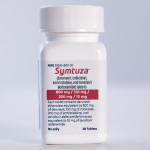Janssen’s newly approved single-tablet antiretroviral (ARV) regimen Symtuza (darunavir/cobicistat/emtricitabine/tenofovir alafenamide) is safe and effective for those with fully suppressed HIV who switch from another boosted protease inhibitor–based regimen, regardless of the previous regimen.
Researchers presented findings from the Phase III randomized noninferiority trial of switching to Symtuza (darunavir/cobicistat/emtricitabine/tenofovir alafenamide) from a boosted protease inhibitor–based regimen at the International AIDS Conference in Amsterdam (AIDS 2018).
Of the 1,141 people enrolled in the study, 70 percent were taking Prezista (darunavir) at the study’s outset while 30 percent were taking Reyataz (atazanavir) or lopinavir. Eighty-five percent were taking Norvir (ritonavir) as a booster while 15 percent were taking Tybost (cobicistat). All those on lopinavir took it with Norvir as a booster, meaning they were taking Kaletra (lopinavir/ritonavir).
Fifty-eight percent of the participants had previously taken at least five ARVs and 15 percent had previously experienced virologic failure.
The participants were randomized to stay on their current regimen or switch to Symtuza. After 48 weeks of treatment, 95 percent of those who switched to Symtuza had a fully suppressed viral load, compared with 94 percent of those who did not switch. One percent of each group experienced virologic failure, defined as either a viral load of 50 or above or stopping treatment early with a viral load above that threshold.
When the study authors broke down the findings according to the different regimens the participants took at the study’s outset, they found comparable results. No one developed drug resistance to any of the ARVs used in the study.
To read a press release about the study, click here.







Comments
Comments